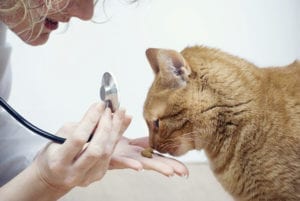 During our pet’s younger years and throughout much of his or her adult life, we may see only the high energy, excitable, and healthy pet that we’ve come to know and love. We may not consider why keeping tabs on our pet at this life stage is so important to lifelong pet health. However, it is precisely during your pet’s younger years that we can best establish a baseline of health for what is normal for your individual pet.
During our pet’s younger years and throughout much of his or her adult life, we may see only the high energy, excitable, and healthy pet that we’ve come to know and love. We may not consider why keeping tabs on our pet at this life stage is so important to lifelong pet health. However, it is precisely during your pet’s younger years that we can best establish a baseline of health for what is normal for your individual pet.
By increasing our level of awareness of our pets’ health – and even the subtler nuances of changes in appetite, behavior, and energy – are we able to carefully gauge and respond to health conditions before they have a bigger impact, or in some cases, prevent the development of diseases and illnesses.
How to Monitor Pet Health
Since our pets cannot directly communicate with us when they don’t feel well, it’s important to learn more about subtle signs of changes in health. So, we may take special care to watch for some of the following common indicators of our pet’s well-being:
Oftentimes pet owners who are so deeply connected to their pets will notice hard to detect behavioral changes before the onset of physical symptoms. That is why keeping a record of your pet’s typical behavioral and physiological norms can play a significant role in maintaining good health.
Why Wellness Care Matters
The other essential component of establishing a baseline of health is through routine wellness care and diagnostics. Maintaining your pet’s routine physical examinations, blood panels, and parasite screenings are paramount to prevention-based medicine.
Routine exams and blood work are often the means through which we detect changes that are not apparent to the naked eye, such as elevated white blood cell count, decreased muscle mass, or lumps or bumps beneath the skin.
The Benefits of Maintaining a Baseline of Health
Through careful observation and communicating changes with your veterinarian, you will ensure a prevention-based approach to your pet’s care. Not only will you feel more informed about your pet’s health and daily care requirements but will also help create a better quality of life for him or her.
Some of the additional benefits of maintaining a baseline of your pet’s health include:
Keeping your pet healthy throughout his or her life relies upon preventive care, careful observation, communication, and maintaining consistent veterinary care. If you would like to discuss how to better gauge your pet’s overall health or bring your pet in for a wellness exam, please contact us to schedule an appointment.
Recent Posts
About Us
We know that choosing the right veterinarian for your pet (and you) can be a challenge. Yet, with our stress-free handling, our long-term, experienced staff, and a state-of-the-art facility, we make the decision an easy one!
